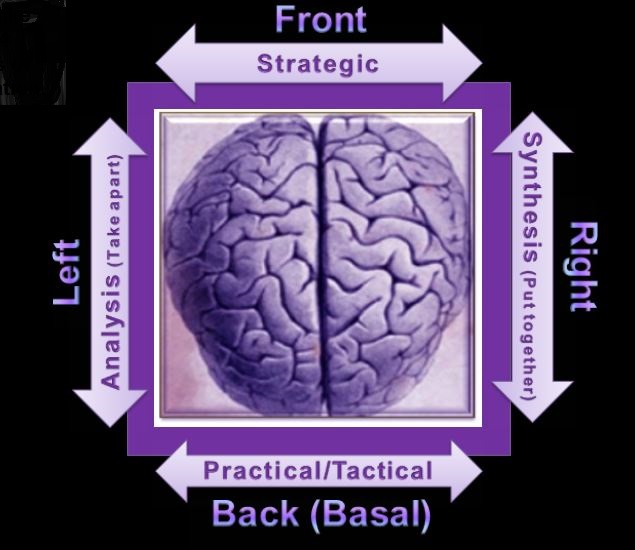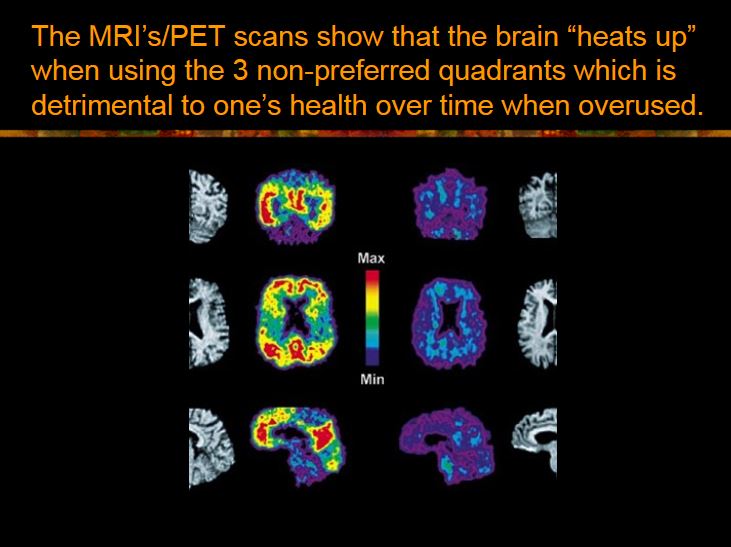Thinking Styles Assessment
How Your Brain Makes You Think
Why It Matters To Understand This

Dr Katherine Benziger takes a completely different approach to thinking styles assessment.
This is in complete contrast to the theoretical and philosophical basis of most psycho-metric tests, that focus on the physiological and neurological aspects of how our brains actually function.
As this is a physiological and neurological assessment it is arguably a more objective method of assessment than psychometric tests.
Katherine Benziger's assessment tools are based on the measurement of brain function and energy consumption in the brain.
Her model recognises that the brain has four specialised areas responsible for different brain functions - and significantly we each have natural strengths in only one of these specific areas.
Thinking Styles Based On Your Brain Functions

- Mode 1 located in the basal left
- Brain functions: order and habit; ordered procedures; sequential routines
Response to stimulus: remembers definitions; remembers what is - as described - Mode 2 located in the basal right
- Brain functions: spiritual experience; rhythm and feeling; harmony
Response to stimulus: remembers definitions; picks up emotional tone and the presence or absence of harmony; how things are and how we feel about it - Mode 3 located in the frontal right
- Brain functions: internal imaging; metaphor and imagination; expressiveness
Response to stimulus: sees the essence of things, in pictures and metaphors - Mode 4 located in the frontal left
- Brain functions: structural analysis; prioritising and logic; mathematics
Response to stimulus: converts into logical results or effects; leads to, or produces results
The Importance Of Using Your Natural Preferred Thinking Styles
We quite naturally prefer to use the thinking style associated with our natural strength - this is referred to as the "preferred thinking and behavioural mode".
This is important and has a very practical application for you:
1. Adapting your natural thinking style to accommodate others affects your performance
Katherine Benziger has identified that when people adapt their natural thinking and working styles to fit expectations of others, [normally created by work and career, tension and stress] people tend to "falsify type" as they think and behave in ways that are unnatural to them, and predictably this creates problems in how they function and perform, specifically in a work environment.

2. The cost of falsifying your thinking style to accommodate others can lead to "Prolonged Adaption Stress Syndrome"
Dr Arlene Taylor, a long time collaborator with Benziger, has developed Benziger's observations about the "cost of falsifying type", and as published in 1999 in their joint paper 'The Physiological Foundations of Falsification of Type and PASS' [published as a book] has identified a range of symptoms collectively known as "Prolonged Adaption Stress Syndrome" (PASS) that arise as a result of falsification of type.
1. Fatigue
2. Hyper-vigilance
3. Immune system alterations
4. Memory impairment
5. Altered brain chemistry
6. Diminished frontal lobe functions
7. Discouragement and or depression
8. Self-esteem problems
Thinking Styles - Resources
Further reading: Books By Katherine Benziger
Presentation Slideshow: Benziger Thinking Styles Assessment
Note - there are c80 slides in this presentation but it contains some very useful information.
Do the test: My Benziger
Note:
- This is not a free test. It is currently on offer at a reduced price of $39.99
- I have no commercial relationship with this company and do not receive any commission or financial payment if you do the test.
- Here is a sample executive summary of a test result
- Here is a sample full test report
Return to: Managing Personal Change
LATEST ARTICLES
The Kingdom Is Here, Now Awakening Is Not Later -
 What contemplative traditions point to - and how progress quietly replaces presence. Across contemplative traditions, a strikingly consistent message appears: truth is not somewhere else, not in the…
What contemplative traditions point to - and how progress quietly replaces presence. Across contemplative traditions, a strikingly consistent message appears: truth is not somewhere else, not in the…Does Prayer Work? The Psychology of Prayer, Meditation and Outcomes
 Reality Is A Complex System Of Countless Interactions - Including Yours. So does prayer work? The problem is that the question itself is usually framed in a way that guarantees confusion. We tend to a…
Reality Is A Complex System Of Countless Interactions - Including Yours. So does prayer work? The problem is that the question itself is usually framed in a way that guarantees confusion. We tend to a…Living in Survival Mode Without Surrendering Mental Authority
Living in Survival Mode Without Surrendering Mental Authority
 Clear Thinking When You’re Just Trying to Stay Afloat. Many people today are overwhelmed because they are living in survival mode - not temporarily, but as a persistent condition of life. For many, th…
Clear Thinking When You’re Just Trying to Stay Afloat. Many people today are overwhelmed because they are living in survival mode - not temporarily, but as a persistent condition of life. For many, th…Manifestation Without Magic: A Practical Model
 Manifestation without magic is not a softer or more intellectual version of popular manifestation culture. It is a different model altogether. Popular manifestation teachings tend to frame reality as…
Manifestation without magic is not a softer or more intellectual version of popular manifestation culture. It is a different model altogether. Popular manifestation teachings tend to frame reality as…Staying Committed When You Can't See Progress - The Psychology of Grit
 Uncertainty Is Not The Absence Of Progress, Only The Absence Of Reassurance. One of the most destabilising experiences in modern life is not failure, but uncertainty and staying committed when you can…
Uncertainty Is Not The Absence Of Progress, Only The Absence Of Reassurance. One of the most destabilising experiences in modern life is not failure, but uncertainty and staying committed when you can…The Battle For Your Mind - How To Win Inner Freedom In A Digital Age Of Distraction
 From External Events to Inner Events. We often think of “events” as things that happen out there: the traffic jam, the rude comment, the delayed email reply. But what truly shapes our experience is wh…
From External Events to Inner Events. We often think of “events” as things that happen out there: the traffic jam, the rude comment, the delayed email reply. But what truly shapes our experience is wh…How to See Your Thoughts Without Becoming the Story
 A Practical Guide to Thought-Awareness. You can spend your life inside the stories of your mind without ever learning how to see your thoughts clearly and objectively. Most of the stuff we tell oursel…
A Practical Guide to Thought-Awareness. You can spend your life inside the stories of your mind without ever learning how to see your thoughts clearly and objectively. Most of the stuff we tell oursel…The Collison Decision Matrix - A Simple Framework for Better Choices
 The Collison Decision Matrix Is A Practical Everyday Thinking Tool. Most of us spend a surprising amount of time worrying about decisions. From small ones such as what to wear, what to eat, what to te…
The Collison Decision Matrix Is A Practical Everyday Thinking Tool. Most of us spend a surprising amount of time worrying about decisions. From small ones such as what to wear, what to eat, what to te…The Power Of Asking The Right Question
 The Power Of Asking The Right Question Lies In The Quest For Insight. To experience the power of asking the right question you must develop the practice of asking questions. The best way to improve th…
The Power Of Asking The Right Question Lies In The Quest For Insight. To experience the power of asking the right question you must develop the practice of asking questions. The best way to improve th…Site Pathways
 Here is a site pathway to help new readers of Zen-Tools navigate the material on this site. Each pathway is based around one of the many key themes covered on this site and contain a 150 word introduc…
Here is a site pathway to help new readers of Zen-Tools navigate the material on this site. Each pathway is based around one of the many key themes covered on this site and contain a 150 word introduc…How To Live With Contradiction - Beyond Thought Let Stillness Speak
 A major impact on so many peoples' lives is the situational contradiction of unfilled realistic expectations. So where does all this leave us? Well here we are, with mental equipment that is more lim…
A major impact on so many peoples' lives is the situational contradiction of unfilled realistic expectations. So where does all this leave us? Well here we are, with mental equipment that is more lim…